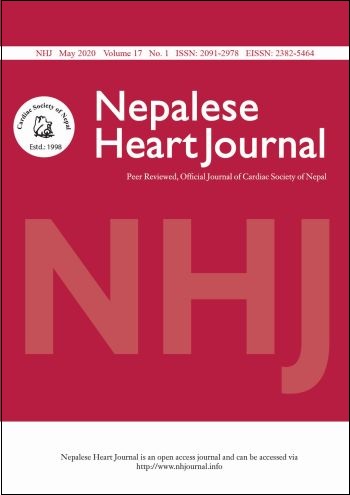Precipitating factors leading to decompensation of heart failure in patients attending a tertiary care centre of Nepal
DOI:
https://doi.org/10.3126/njh.v17i1.28798Keywords:
Decompensation, Heart failure, Precipitating factorsAbstract
Background and Aims: Heart failure is one of the debilitating conditions in patients with various forms of heart disease. It can have impacts on various aspects of the life of a patient. There have been few studies on the etiological aspects and precipitants of heart failure in the Nepalese population. The aim of our study is to find out the major factors that lead to decompensation of heart failure in patients who already have established heart failure.
Methods: This study was a single-centre, prospective, observational study conducted in the emergency department of Manmohan Cardiothoracic Vascular and Transplant Centre (MCVTC) from 1st June 2019 to 30th November 2019. Hundred and one patients with established heart failure in the past, who presented again with decompensated heart failure were enrolled.
Results: The mean age of the patients was 62.81 years (SD=15.92). Factors responsible for acute decompensation of heart failure were identified in 95.0 % of patients included in the study. The most common factor identified was poor compliance with medications and diet and fluid intake (38.6%). Next to it was arrhythmia identified in about 35.6% of cases.Other important factors responsible for decompensation in our study were infection (12.8%), anemia (4.9%) and ischemia (2.9%).
Conclusion: Preventable and identifiable factors are responsible for the decompensation of heart failure. Most of these factors can be modified with the use of proper patient counseling/patient education, thereby reducing recurrent hospital admissions and economic burden to the patient and the government as well.
Downloads
Downloads
Published
How to Cite
Issue
Section
License
This license enables reusers to distribute, remix, adapt, and build upon the material in any medium or format, so long as attribution is given to the creator. The license allows for commercial use.




